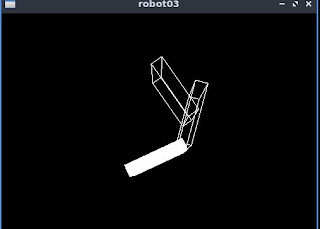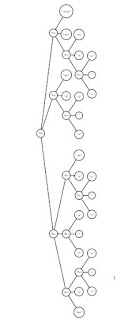OpenGL en Haskell (material opcional)
Es posible utilizar OpenGL en Haskell, pero les mentiría si les digo que es
un resultado garantizado... Depende de varias cosas. Y solo puedo dar notas
para Ubuntu 18 al respecto.
Primero, hacer esto:
sudo apt install freeglut3-dev
Luego, hacer esto:
cabal update
(cabal es un instalador de paquetes para ghc)
Luego, hacer lo siguiente:
cabal install GLUT
(Se consume algo de espacio, para ser al menos medio giga... :( )
De salir todo bien, ahora inspeccionar el siguiente sitio:
https://archives.haskell.org/code.haskell.org/GLUT/examples/RedBook/
...... Wuiiiii
Tomar de aquí algún archivo y compilarlo.
Por ejemplo, Robot.hs
ghc -o robot Robot.hs
(imagen de una versión mía modificada de Robot.hs)
El código de Robot.hs lo coloco aquí, redundantemente.
{-
Robot.hs (adapted from robot.c which is (c) Silicon Graphics, Inc.)
Copyright (c) Sven Panne 2002-2005 <sven.panne@aedion.de>
This file is part of HOpenGL and distributed under a BSD-style license
See the file libraries/GLUT/LICENSE
This program shows how to composite modeling transformations to draw
translated and rotated hierarchical models. Interaction: pressing the s
and e keys (shoulder and elbow) alters the rotation of the robot arm.
-}
import Data.IORef ( IORef, newIORef )
import System.Exit ( exitWith, ExitCode(ExitSuccess) )
import Graphics.UI.GLUT
data State = State { shoulder, elbow :: IORef GLint }
makeState :: IO State
makeState = do
s <- newIORef 0
e <- newIORef 0
return $ State { shoulder = s, elbow = e }
myInit :: IO ()
myInit = do
clearColor $= Color4 0 0 0 0
shadeModel $= Flat
display :: State -> DisplayCallback
display state = do
clear [ ColorBuffer ]
-- resolve overloading, not needed in "real" programs
let translatef = translate :: Vector3 GLfloat -> IO ()
scalef = scale :: GLfloat -> GLfloat -> GLfloat -> IO ()
preservingMatrix $ do
translatef (Vector3 (-1) 0 0)
s <- get (shoulder state)
rotate (fromIntegral s :: GLfloat) (Vector3 0 0 1)
translatef (Vector3 1 0 0)
preservingMatrix $ do
scalef 2 0.4 1
renderObject Wireframe (Cube 1)
translatef (Vector3 1 0 0)
e <- get (elbow state)
rotate (fromIntegral e :: GLfloat) (Vector3 0 0 1)
translatef (Vector3 1 0 0)
preservingMatrix $ do
scalef 2 0.4 1
renderObject Wireframe (Cube 1)
swapBuffers
reshape :: ReshapeCallback
reshape size@(Size w h) = do
viewport $= (Position 0 0, size)
matrixMode $= Projection
loadIdentity
perspective 65 (fromIntegral w / fromIntegral h) 1 20
matrixMode $= Modelview 0
loadIdentity
-- resolve overloading, not needed in "real" programs
let translatef = translate :: Vector3 GLfloat -> IO ()
translatef (Vector3 0 0 (-5))
keyboard :: State -> KeyboardMouseCallback
keyboard state (Char c) Down _ _ = case c of
's' -> update shoulder 5
'S' -> update shoulder (-5)
'e' -> update elbow 5
'E' -> update elbow (-5)
'\27' -> exitWith ExitSuccess
_ -> return ()
where update joint inc = do
joint state $~ ((`mod` 360) . (+ inc))
postRedisplay Nothing
keyboard _ _ _ _ _ = return ()
main :: IO ()
main = do
(progName, _args) <- getArgsAndInitialize
initialDisplayMode $= [ DoubleBuffered, RGBMode ]
initialWindowSize $= Size 500 500
initialWindowPosition $= Position 100 100
createWindow progName
state <- makeState
myInit
displayCallback $= display state
reshapeCallback $= Just reshape
keyboardMouseCallback $= Just (keyboard state)
mainLoop


Comentarios
Publicar un comentario